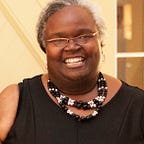Nobody Likes an Uppity Negro
I remember watching the video of Sandra Bland’s arrest in 2015 and feeling a knot in my stomach. There is a moment when her defensive agitation and anger crumble into fear. You can hear the shift of awareness in her voice. She knows how wrong the whole situation is; she also knows how powerless she really is.
I remember when a white friend said to me, in reference to the video of Ms. Bland and the officer, “they both behaved so badly,” regarding raised voices and bad attitudes. In the days following Sandra Bland’s death, I reflected on why a woman who didn’t want to put out her cigarette ended up being arrested. She raised her voice and questioned the power of the system represented by an officer hell bent on controlling her in that moment. The system answered her with abuse.
I remember watching Eric Garner get choked to death by police. His crime, selling cigarettes, was negligible and non-violent. His true offense was daring to be upset with the system represented by the officers who approached him. Why were there so many officers there to talk to a man about selling cigarettes? “If he had just done what they said…” was the critique. I wondered if it was possible to stay calm when you know you’re being executed.
I remember the “beer summit,” an apology of action forced upon President Obama for questioning the wisdom of a Cambridge Police officer who arrested a black, Harvard Professor trying to enter his own home. Obama said the officer “acted stupidly.” America’s first black President dared to critique the system he was charged with leading. In response, the system told him to sit his black a — down and have a beer with the white guy who refused to apologize for arresting the other brilliant — and innocent — black man in the story.
The end of each of these stories is different. Sandra Bland was arrested (and died in police custody). Eric Garner was murdered by the police in broad daylight. And President Obama pretended to enjoy the crow that he had to eat while he drank his beer. The underlying cause for each conflict, however, is the same. Black Americans who challenge white authority always pay a price.
Back in the days when America was “great,” the term “uppity negro” was applied to a black person who dared to step out of the space defined for them by the white-dominated social order. Uppity Negroes met violent ends for crossing the “whites only” barriers of the Jim Crow era. Uppity Negroes fought for the right to vote. Uppity Negros studied hard and learned to use the system’s rules in order to transform the system itself. More recently, some seriously Uppity Negroes dared to proclaim the value of Black Lives in Ferguson, MO. Calling this country to live up to its ideals has always been the task of the Uppity Negro.
Cue Colin Kaepernick:
“I am not going to stand up to show pride in a flag for a country that oppresses Black people and people of color… To me, this is bigger than football…” -Colin Kaepernick
Since beginning his protest last season, Mr. Kaepernick has been vilified in social media as disrespectful and un-American. He’s been called more than a few names and told to find another country to call home. It appears that he’s also been unofficially blacklisted from playing in the NFL.
Why make all this fuss over one man’s silent protest? It’s because the conversation on racial justice agitates White America beyond reason. The internet debates regarding Kaepernick’s level of patriotism make sense when placed in the context of a dysfunctional family system. As he and now others kneel in protest they are visible reminders of our national family shame. As Kaepernick states, ’“There are bodies in the streets.”
Black bodies have always been at the center of the national conversation we keep sidestepping. In the weekend following Donald Trump’s shameless demand that black men (or “sons of b!tches” to use his words) stop protesting injustice and stick to concussing themselves, NFL teams struggled to define acceptable protest postures for black bodies. That is, they struggled to find expressions of protest that were acceptable to white teammates and white owners. Coaches and teammates spoke of a desire to reflect Unity; Uppity was not an option. But it’s hard to reflect true unity when White Comfort limits how the unjust treatment of black and brown bodies can be lamented. It’s worth noting that none of the white owners kneeling with their black players on the sidelines that weekend moved to offer a job to Kaepernick, the black man who started this ball rolling in the first place.
Colin Kaepernick dared to ask his country to do better. Instead of better he got punished. He’s likely lost his career because he forgot his place, because he asked for justice. His banishing is another example of the non-lynching version of White America’s response to the Uppity Negro. But what he’s lost in compensation he’s gained in legacy. The truth is that nobody likes an Uppity Negro…except those of us still fighting to be truly free.
If you find this post helpful, please share it with a friend.
Follow me! We need each other.
